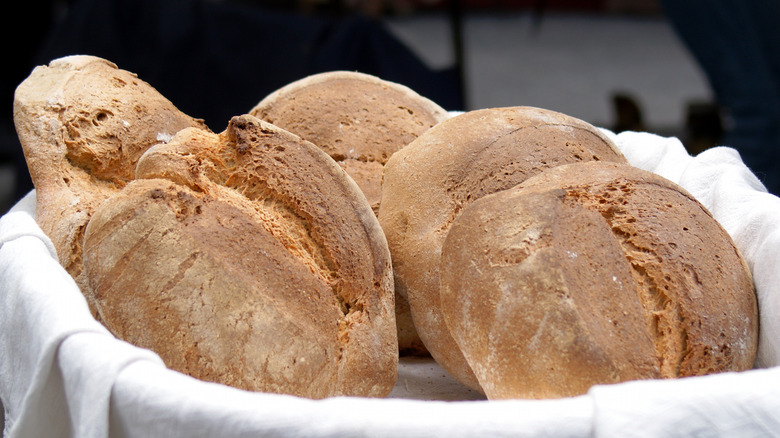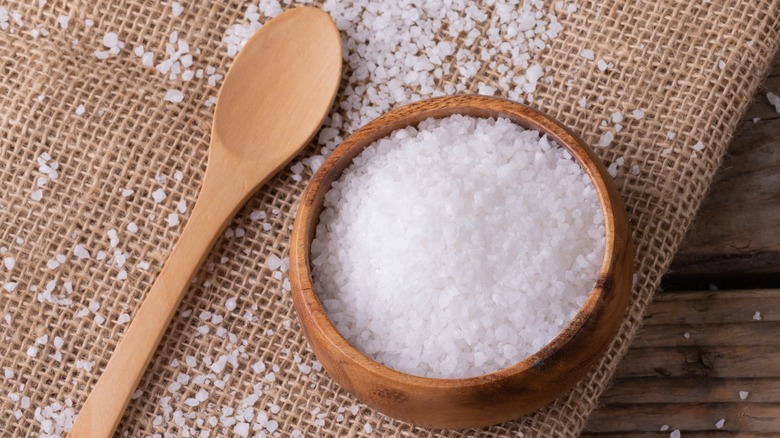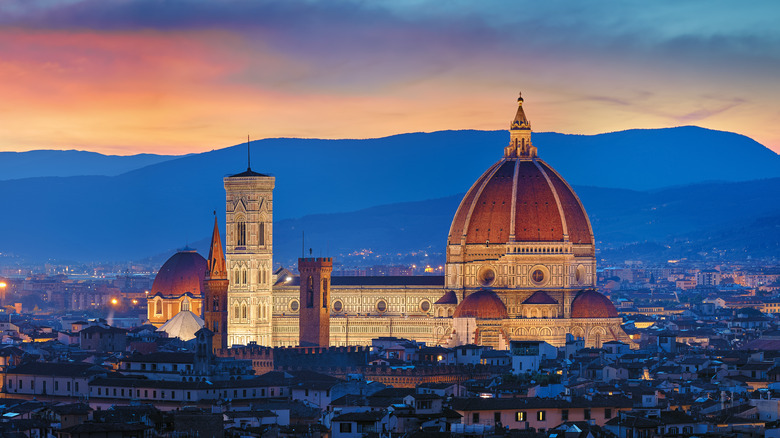The Historic Reason Some Bread In Central Italy Is Unsalted
You're sitting under a wide umbrella, shielded from the scorching sun of a hot afternoon in Florence. It's your first time in the city, let alone Italy. You've heard and read so many stories about how amazing Italian food is. The bread, in particular, as it is written about in Italy Magazine, is an absolute essential of the Italian diet and is eaten with virtually every meal. You're excited to try some. You order yourself some Pane Toscano and olive oil. It arrives at your table and your excitement is palpable. You thank your server, take a bite, and taste ... nothing. You're confused, so you ask your server why the bread tastes so bland. The explanation? In Florence, bread is made without salt.
Your initial shock will likely lead to a general curiosity: Why don't Florentines put salt in their bread? Saltless bread isn't indicative of Florence alone. Almost all of Central Italy, which includes Tuscany, Umbria, parts of Lazio, and Le Marche, exclude salt from their bread-making process, per Devour Tours. There are numerous theories that vary depending on where in Central Italy you find yourself as to why this phenomenon exists. These tales range from the epic and poetic to the mundane and obvious.
Perugia's Salt War
The United States is not the only place to revolt over rising taxes. According to Trips-2-Italy.com, the city of Perugia in Umbria did something similar in 1540 in what history remembers as The Salt War was a conflict in flat-out defiance of papal authority. Essentially, Perugia, though being part of the Papal States — an area of Italy controlled by the Papacy in Rome, per Britannica – was allowed a fair amount of autonomy in terms of trade and taxation. However, Pope Paul III, seeking to end Perugia's independence, astronomically increased the tax on salt. The people of Perugia rose in revolt as a result. Though the rebellious rabble was quickly put down by a massive papal force, it is said that one of the ways in which they defied the Pope was to not use salt to bake bread.
Though this story is popular among locals, there is evidence to suggest that The Salt War was not the origin point of the city's love of unsalted bread. Zachary Nowak explains (via Atlas Obscura) that meticulous records kept by Perugia's Ospedale di Santa Maria della Misericordia show that not a single lira was spent on salt, despite the hospital having its own bakery. Nowak concluded that if residents of Perugia were used to salting bread before the revolt, after defeat, they would have started using it again. Only they didn't, which suggests a broader story.
The question of Florence
This brings us to Florence. During the time of Perugia's Salt War, Florence was part of The Grand Duchy of Tuscany run by the Medicis and, therefore, not at the mercy of Papal salt taxation (via Britannica). Yet the Florentines did not salt their bread, either. This fact is alluded to in the "Divine Comedy," in which Dante Alighieri notes that upon his exile, he will "know the bitter taste of others' bread, how salt it is." Those words appeared in 1320, over two centuries before Perugia's revolt. And while many suggest that Dante was simply using a metaphor, Zachary Nowak explains that there needs to be a real-world connection for the analogy to make any sense (via Atlas Obscura). And why point out bread's saltiness if all bread was already salted?
Despite all of the historical fog that surrounds the origins of pane sciapo, the answer could be as simple as that food is already salty enough. According to The Florentine, the food of Tuscany is so jam-packed with flavor that to add salt to the bread would be an insult to the food and the chef who made it. The lack of taste in pane toscano or other unsalted Central Italian bread allows the flavors of the foods they are paired with to shine. However, there is no definitive answer as to exactly how Central Italy's bread came to be unsalted. The reason may not be a singular answer but a collection of them.


